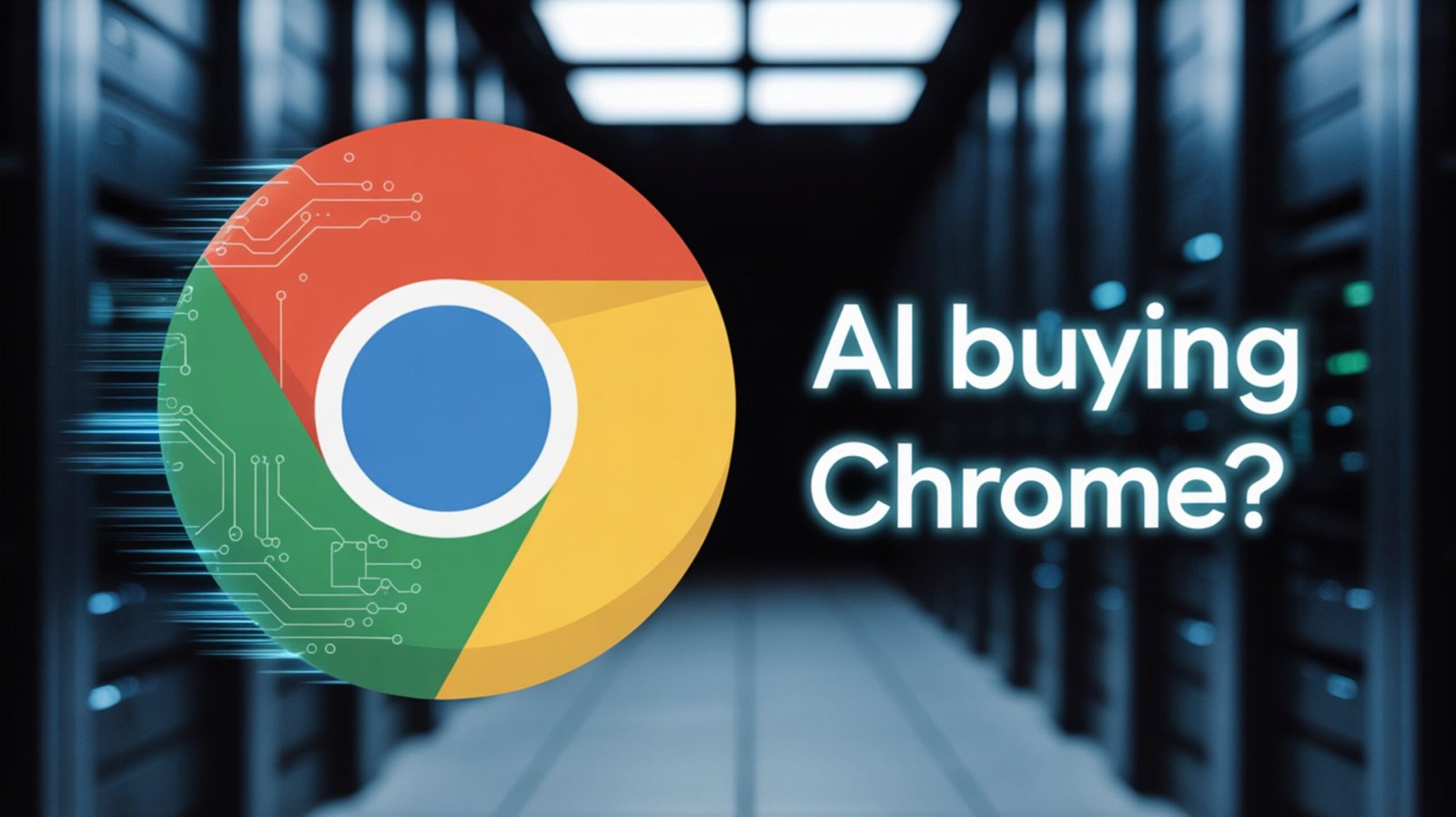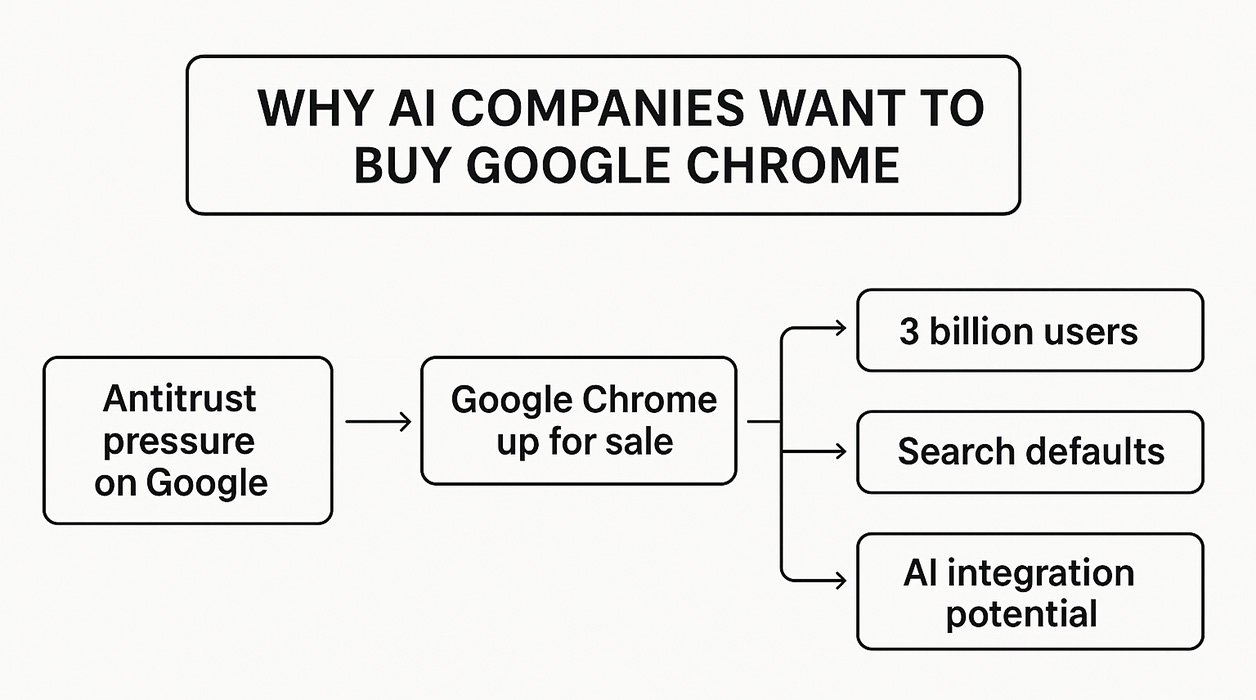Google Chrome has unexpectedly become the hottest technology and artificial intelligence topic in recent months. With the U.S. Department of Justice and regulators across Europe intensifying their antitrust investigations into Google’s dominance in search, the future of Chrome is under scrutiny. What once seemed unimaginable—Google being forced to sell Chrome—is now being openly discussed. And unsurprisingly, major AI companies are circling with growing interest.
Chrome changing hands could redefine the AI vs. search engine battle and reshape how billions of people access the web. Let us dive into why AI companies are suddenly eager to buy Chrome, who the key players are, and how this shift could transform the internet as we know it.
The Antitrust Pressure on Google Chrome
Google has long been accused of leveraging Chrome’s dominance to cement its monopoly in online search. With over 3.2 billion users worldwide, Chrome is a gateway to the internet. Chrome’s default search engine placement has always tilted toward Google Search, raising serious competition concerns.
As U.S. courts increasingly side with regulators, there is a realistic chance that Google could be forced to divest Chrome to reduce its control over search markets. If this happens, Chrome could become one of the most valuable digital assets available for acquisition—something no AI company wants to miss.
Why Chrome Is a Goldmine for AI Companies
Chrome is not just a browser but the front door to the internet. Here are the main reasons AI-driven companies see it as a strategic opportunity:

- Massive User Base – Over 3 billion people use Chrome, giving instant access on a global scale.
- Default Search Control – The owner decides which search engine appears by default, directly influencing billions of daily searches.
- Data Flow & User Behavior – Browsing history, engagement, and interaction data are invaluable for training AI models.
- Advertising Power – A new owner could monetize Chrome’s traffic differently, bypassing Google’s advertising stranglehold.
- AI Integration Potential – A reimagined Chrome could become the first AI-native browser, reshaping how users search, browse, and consume content.
For AI companies, buying Chrome means leapfrogging years of competition to become leaders in search and browsing ecosystems instantly.
Perplexity AI’s Bold $34.5 Billion Offer
One of the most surprising players to show serious intent is Perplexity AI, a rapidly growing startup known for its AI-powered search assistant. Perplexity has reportedly made a $34.5 billion cash offer to acquire Chrome.
This acquisition would allow Perplexity to turn Chrome into an AI-first browser, seamlessly integrating natural language queries, voice-based search, and contextual AI assistance into daily browsing. Such a move could threaten both Google Search and Microsoft’s Bing AI initiatives.
Search.com’s Counter with User Incentives
Not to be outdone, Search.com quickly countered with a $35 billion bid, sweetened by promises of user incentives. Their strategy focuses on luring users away from Google with rewards programs, free cloud storage, and loyalty-based perks.
By tying financial rewards to search behavior, Search.com hopes to rapidly build a community of engaged users while maintaining Chrome as the most widely used browser.
Ecosia’s Unique Stewardship Proposal
Unlike others, Ecosia, the eco-friendly search engine, is proposing something different—a stewardship model. Under this plan, Google would technically retain ownership, but Ecosia would run and manage Chrome with transparency and public accountability.
This approach aligns with Ecosia’s mission of using profits to plant trees and support environmental causes, but it remains to be seen whether regulators and investors would consider it viable. Still, it highlights how even mission-driven companies see Chrome as essential to the digital future.
OpenAI and Yahoo Join the Race
Two other names rumored to be exploring a Chrome acquisition are OpenAI and Yahoo.
- OpenAI, backed heavily by Microsoft, is already leading the AI revolution with ChatGPT. If it acquires Chrome, OpenAI could combine conversational AI with browsing, creating the world’s first deeply integrated AI-browser ecosystem.
- Once a search giant, Yahoo sees Chrome as a chance for a comeback. With declining relevance in recent years, Yahoo could leverage Chrome to return as a major player in search and AI-driven digital services.
Both companies bring unique advantages, and their entry into the competition highlights the strategic importance of Chrome in the AI era.
The Rise of AI-Integrated Browsers
Even without Chrome, some AI companies are already betting that the future of browsing lies in AI integration. Several startups are developing browsers that act as AI assistants, capable of summarizing pages, answering questions, and predicting user needs before they type.
These next-generation browsers position AI not as an add-on, but as the core browsing experience. If Chrome ends up in the hands of an AI company, it could accelerate this transformation overnight.
The Battle for the Front Door of the Internet
At its core, the race for Chrome is about owning the gateway to user attention. Search engines, advertising platforms, and AI services all compete for the same thing: time, engagement, and trust.
By owning Chrome, an AI company would instantly secure a direct channel to billions of people, bypassing traditional search engines and reimagining how we discover information. It would also allow them to shape the defaults of the internet itself, which has historically determined winners and losers in the tech industry.
What This Means for Users
If Chrome changes ownership, users could see massive shifts in how their browsing works:
- AI-powered assistants are integrated directly into the browser.
- More customizable search defaults instead of being locked into Google.
- New privacy models that could either improve or worsen data collection.
- Potential rewards and incentives for using specific search engines.
- A complete redefinition of the browsing experience where AI becomes central.
For users, this could mean either greater choice and innovation or increased concerns about data privacy and monopoly power shifting from one giant to another.
The Future of Chrome in the AI Era
The sudden interest in Chrome underscores how critical browsers remain in the age of artificial intelligence. While many predicted the browser’s decline with the rise of apps and mobile platforms, it is clear that browsers are still the front door to digital life.
Whoever controls Chrome will not just control a browser—they will control the flow of information, the direction of AI integration, and the very architecture of the web.
With billions at stake, the battle over Chrome may become one of tech history’s most defining events.
Wrap Up
AI companies are not just looking to buy Chrome for its brand—they want its strategic power as the gateway to the internet. From Perplexity’s ambitious cash offer to Ecosia’s stewardship model, the competition is heating up. Whether regulators approve a sale or not, one thing is sure: the browser wars are back, and AI is leading the charge.

Selva Ganesh is a Computer Science Engineer, Android Developer, and Tech Enthusiast. As the Chief Editor of this blog, he brings over 10 years of experience in Android development and professional blogging. He has completed multiple courses under the Google News Initiative, enhancing his expertise in digital journalism and content accuracy. Selva also manages Android Infotech, a globally recognized platform known for its practical, solution-focused articles that help users resolve Android-related issues.




Leave a Reply